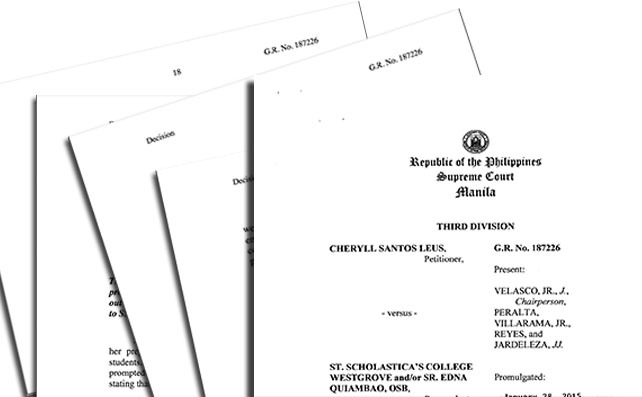Leus v. St. Scholastica’s College Westgrove (SSCW) is about the limit of the right of private employers to enforce their private view of morality. Cheryll Santos Leus was a non-teaching personnel at SSCW, a Catholic school in Cavite. In May 2003, upon learning of Leus’ pregnancy out of wedlock, SSCW asked her to resign. Leus refused. SSCW asked her to explain why she shouldn’t be fired given that pre-marital sex is a “serious misconduct and conduct unbecoming of an employee of a Catholic school.”
Leus said she wasn’t aware that SSCW had a policy against pregnancy out of marriage. She also demanded SSCW to produce the policy that she violated, so that she could defend herself better. SSCW said that Section 94(e) of the 1992 Manual of Regulations for Private Schools (1992) considers “disgraceful or immoral conduct” as a valid ground for dismissal.
After an exchange of letters, in June 2003, SSCW finally decided to fire Leus. The termination letter said that “pre-marital sexual relations between two consenting adults with no impediment to marry, even if they subsequently married, amounts to immoral conduct.” The letter further said that SSCW “finds unacceptable the scandal brought about by the petitioner’s pregnancy out of wedlock as it ran counter to the moral principles that SSCW stands for and teaches its students.”
Leus brought the case to a labor tribunal, which decided in favor of SSCW. All Leus’ appeals failed, until the Philippine Supreme Court ruled in her favor in January 2015. Penned by Associate Justice Bienvenido Reyes, Leus v. SSCW sets forth what can be called “The Purely Public and Secular View of Morality Test,” or The Leus Test.
The test clarifies what morality clauses in laws refer to. Distilling earlier cases [(CHua-Qua v. Clave (1990), Estrada v. Escritor (2003), Anyonymous v. Radam (2007)], the Leus Test have the following elements:
Context. Consider the totality of the circumstances surrounding the conduct
Contemporary societal morality. Assess the said circumstances vis-a-vis the prevailing norms of conduct, i.e. what the society generally considers moral and respectable.
Public and secular dimension. The conduct must be “detrimental to conditions upon which depend the existence and progress of human society” (based on Estrada v. Escritor).
Burden of Proof. The one who accuses immorality must be the one who should present “substantial evidence” that the conduct is immoral after weighing it against the above-mentioned elements.
However, this does not curtail the freedom of people to practice a moral life as prescribed by the religion of their choice. It is rather a substantive elaboration of the classic dicta about the limits of our rights: Your right stops at the tip of someone’s nose. This very strict test prohibits arbitrary determination of the immorality of an act. The decision implies that a religious or any institution cannot just arbitrarily impose its view of morality on their employees. In order for the State to evaluate whether an institution is justified in its imposition of its moral view on others, an institution has to provide substantial evidence that a particular conduct is immoral after 1) considering the totality of circumstances surrounding the conduct; 2) assessing the conduct in light of contemporary societal morality; and 3) determining whether the conduct is “detrimental to conditions upon which depend the existence and progress of human society.” Thus, an institution may judge a conduct immoral and penalize the erring person, but for this act of punishing someone to be legal the institution must satisfy the Leus Test.
For LGBT employees in the Philippines, the Leus Test protects them from being rejected, suspended, disciplined, and terminated simply because their being LGBT is considered by employers as immoral. LGBT people, just like Leus, are often put on the defensive by employers, demanding that LGBT people justify why they don’t deserve to be rejected, suspended, disciplined, and terminated given that being LGBT is against the religious beliefs of the employer. The Leus Test changes the situation. Employers should be the one justifying why their imposition of their private morality on their employers is within what is legally permissible in light of a strictly neutral secular view of morality. Given the Leus Test, it would be very difficult to legally defend discrimination against LGBT people on the basis of religious beliefs.
It’s time to teach bigot employers a lesson: Sue them.
Since 2001, as she was about to turn 19, Sass has dedicated herself to the LGBT Rights movement in the Philippines, most specifically to issues of gender identity and freedom of gender expression. James Green, an international transgender rights activist, served as her mentor via email. She started giving discussions on transgender rights and issues in Luneta Park in Manila. In December 2002, she co-founded the Society of Transsexual Women of the Philippines (STRAP). In 2003 & 2004, together with Drs Sam Winter and Mark King of the University of Hong Kong, she did the first comprehensive study on transgender women in the Philippines. The study has been published in the International Journal of Transgenderism. In 2009, she was one of the LGBT activists invited to speak in a historic United Nations General Assembly side-event at the United Nations Headquarters in New York. In 2013, she received the ECHO Award, given annually to excellent and promising migrant students in the Netherlands. In 2014, she received the Harry Benjamin Distinguished Education and Advocacy Award from the World Profession Association for Transgender Health. A nomadic spirit, Sass loves to write, walk, read, cycle, and cook. Together with the love of her life, Sass is currently based in The Hague, The Netherlands. She graduated with a Combined major in World Politics & Global Justice, minor in International Development (Magna cum Laude) at Leiden University College, which bestowed her the 2014 Global Citizenship Award. She is a contributing writer on TG issues for the mag, through The Activist. Sass.Rogando.Sasot@outragemag.com

































































